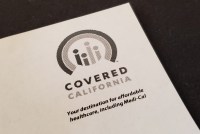Latest KFF Health News Stories
Pfizer and Moderna Are Pushing the New Covid Booster. Should You Get It? The CDC Is About to Decide.
Chances are, if you aren’t older, chronically ill, or obese, you don’t need a forthcoming covid vaccine to stay out of the hospital. But it probably wouldn’t hurt.
Hollywood’s A-List Health Insurance Is Jeopardized by the Labor Strikes
Hollywood actors and writers who qualify for their union health plans get a very good deal compared with other Americans. But not working during the strike threatens their eligibility in the system.
What the Health? From KFF Health News: 3 Health Policy Experts You Should Know
In this special episode of KFF Health News’ “What the Health?” host Julie Rovner interviews three health policy experts.
She Paid Her Husband’s Hospital Bill. A Year After His Death, They Wanted More Money.
A widow encountered a perplexing reality in medical billing: Providers can come after patients to collect well after a bill has been paid.
Timing and Cost of New Vaccines Vary by Virus and Health Insurance Status
Flu. Covid. RSV. When and how to get vaccinated against them can be confusing. Here are some of the most important things to know.
After Backlash, Feds Cancel Plan That Risked Limiting Breast Reconstruction Options
The Centers for Medicare & Medicaid Services backed off from a plan that could have curtailed access to a type of reconstructive surgery known as DIEP flap. Breast cancer patient advocates are relieved.
Doctors and Patients Try to Shame Insurers Online to Reverse Prior Authorization Denials
Prior authorization is a common tool used by health insurers for many tests, procedures, and prescriptions. Frustrated by the process, patients and doctors have turned to social media to publicly shame insurance companies and elevate their denials for further review.
A New Medicare Proposal Would Cover Training for Family Caregivers
The federal government is proposing having Medicare pay professionals to train family caregivers how to perform tasks like bathing and dressing their loved ones, and properly use medical equipment.
What the Health? From KFF Health News: On Abortion Rights, Ohio Is the New Kansas
Nearly a year to the day after Kansas voters surprised the nation by defeating an anti-abortion ballot question, Ohio voters defeated a similar, if cagier, effort to limit access in that state. This week, they rejected an effort to raise the threshold for approval of future ballot measures from a simple majority, which would have made it harder to protect abortion access with yet another ballot question come November. Meanwhile, the number of Americans without health insurance has dropped to an all-time low, though few noticed. Joanne Kenen of the Johns Hopkins Bloomberg School of Public Health and Politico, Rachel Roubein of The Washington Post, and Emmarie Huetteman of KFF Health News join KFF Health News’ chief Washington correspondent, Julie Rovner, to discuss these issues and more. Also this week, Rovner interviews Kate McEvoy, executive director of the National Association of Medicaid Directors, about how the “Medicaid unwinding” is going, as millions have their eligibility for coverage rechecked.
Lo que hay que saber para no perder Medicaid
Gran parte de los beneficiarios de Medicaid que perdieron la cobertura fue porque no completaron el papeleo necesario para permanecer en el seguro.
Lost Medicaid Health Coverage? Here’s What You Need to Know
Patient advocates are tackling the “overwhelming task” of connecting people with health insurance as millions lose coverage due to the end of pandemic protections on Medicaid eligibility.
His Anesthesia Provider Billed Medicare Late. He Got Sent to Collections for the $3,000 Tab.
Medicare was supposed to cover the entire cost of his procedure. But after the anesthesia provider failed to file its claims in a timely manner, it billed the patient instead.
What the Health? From KFF Health News: Another Try for Mental Health ‘Parity’
President Joe Biden is kicking off his reelection campaign in part by trying to finish a decades-long effort to establish parity in insurance benefits between mental and physical health. Meanwhile, House Republicans are working to add abortion and other contentious amendments to must-pass spending bills. Joanne Kenen of the Johns Hopkins Bloomberg School of Public Health and Politico, Anna Edney of Bloomberg, and Sarah Karlin-Smith of the Pink Sheet join KFF Health News’ chief Washington correspondent, Julie Rovner, to discuss these issues and more. Also this week, Rovner interviews KFF Health News’ Céline Gounder about her podcast “Epidemic.” The new season focuses on the successful public health effort to eradicate smallpox.
Los líderes legislativos habían presionado a Newsom, también demócrata, para que canalizara los ingresos fiscales hacia la reducción de los costos de la atención sanitaria.
Covered California to Cut Patient Costs After Democratic Lawmakers Win Funding From Gov. Newsom
California’s health insurance exchange will reduce how much some patients pay for care next year, including hospital deductibles, appointment copays, and prescription drugs. Lawmakers pressed Gov. Gavin Newsom to make good on a four-year-old pledge to use proceeds from a tax penalty on uninsured people to help people pay for treatment.
Hospitals Ask Congress to Delay ACA Medicaid Funding Cuts — For the 14th Time
Congress has until October to avert cuts to a Medicaid program intended to support safety-net hospitals that, in practice, improves the bottom lines of other hospitals, too. Hospital leaders say now is not a good time for the cuts — which lawmakers have so far postponed 13 times.
Everything Old Is New Again? The Latest Round of Health Policy Proposals Reprises Existing Ideas
House Republican legislation promises more health insurance options but fewer protections, even as the Biden administration seeks to rein in short-term plans, which were expanded in the Trump era.
Journalists Discuss Abortion Lawsuits and the Pros and Cons of Health Care Sharing Plans
KFF Health News and California Healthline staff made the rounds on national and local media this week to discuss their stories. Here’s a collection of their appearances.
Medical Debt Is Making Americans Angry. Doctors and Hospitals Ignore This at Their Peril.
Doctors and hospitals hold an exalted position in American life, retaining public confidence even as other institutions such as government, law enforcement, and the media are losing people’s trust. But with health care debt out of hand, medical providers risk their good standing.
A Mom Owed Nearly $102,000 for Hospital Care. Her State Attorney General Said to Pay Up.
As politicians bash privately run hospitals for their aggressive debt collection tactics, consumer advocates say one North Carolina family’s six-figure medical bill is an example of how state attorneys general and state-operated hospitals also can harm patients financially.






















